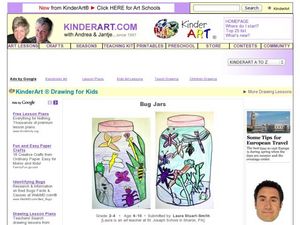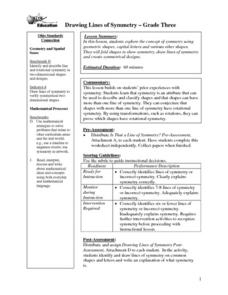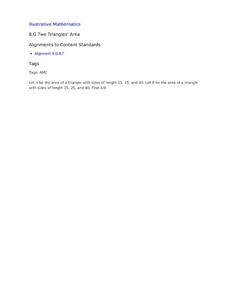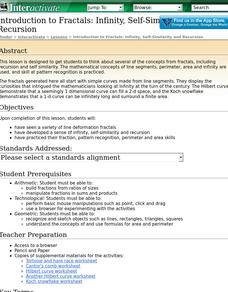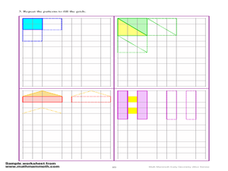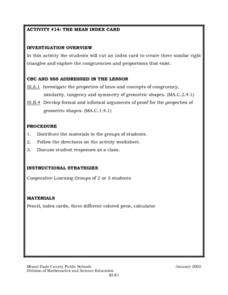Curated OER
Bug Jars
Young scholars explore symmetry. Students observe a variety of bug and plant drawings, then draw a bug jar. Young scholars observe bugs from the top of the jar for a symmetrical view, and the side of the jar for an asymmetrical...
Curated OER
Geometry, Measurement & Reasoning
Pupils complete worksheets involving rotational symmetry. In this geometry lesson, students complete worksheets to identify rotational symmetry and rotations. They compare and contrast rotated figures. Pupils examine the relationship...
Curated OER
Lines of Symmetry
In this lines of symmetry worksheet, students check yes or no after determining whether diagrams show lines of symmetry. A reference web site is given for additional activities.
Curated OER
Drawing Lines of Symmetry
Third graders explore the concept of symmetry using geometric shapes, capital letters and various other shapes. They fold shapes to show symmetry, draw lines of symmetry and create symmetrical designs.
Curated OER
Symmetry of Flags
Students explore, examine and study the symmetry of the flags of individual countries in the EU. They identify and describe the reflection and rotation symmetries of two-dimensional shapes and assess how symmetry changes with respect to...
Curated OER
Reflections over Two Lines & Dilations
Students create reflections over two lines. For this reflections worksheet, students compare and contrast reflections over parallel and intersecting lines. They dilate figures and investigate the effect of the dilation using measurement...
Curated OER
Draw A Face
Students discover how to sketch a face. In this sketching instructional activity, students explore the steps to construct a facial drawing. Spacing and symmetry of facial features are explored.
Curated OER
Mirror Lines
In this mirror lines and symmetry activity, students solve 12 problems in which lines of symmetry are drawn and counted. This page is intended to be an online activity, but can be completed on paper.
Curated OER
Two Triangles' Area
Need an activity for teaching the Pythagorean Theorem? Geometry juniors apply the Pythagorean theorem to two triangles to determine a final calculation.
Dick Blick Art Materials
Start with a Circle...
The Golden Ratio. The Divine Proportion. Yup. It's math and art blended into one colorful activity. Young artists combine colored tissue paper circles and parts of circles to create geometric patterns. As a bonus, kids get to figure out...
Radford University
How to Calculate and Analyze the Equation for a Parabolic Path
Working in groups, pupils plot three points on the coordinate plane representing three different parabolic paths. Using a calculator, they determine the quadratic regression equation for their models. Each team then figures out the...
Curated OER
Introduction to Fractals: Infinity, Self-Similarity and Recursion.
This instructional activity introduces young scholars to the ideas involved in understanding fractals. They develop a sense of infinity, self-similarity and recursion and
Curated OER
As the Bird Flies
Learners investigate the properties of lines and congruent triangle theorems as well as apply geometric properties and relationships to real-world mathematical problems. Given two different scenarios, they examine maps that have been...
Curated OER
Geometric Transformations
Learners examine images and preimages of a mapping and identify isometry. They view images by M.C. Escher, observe teacher demonstrations, and create a translation image, a rotation image, and a dilation.
Curated OER
No-Three-In-A-Line Again
Students interpret information and results in context while using words and symbols to generalize patterns. They use symmetry and angle properties of polygons to solve practical problems and identifying invariant properties under...
Mathematics Vision Project
Module 6: Congruence, Construction, and Proof
Trace the links between a variety of math concepts in this far-reaching unit. Ideas that seem very different on the outset (like the distance formula and rigid transformations) come together in very natural and logical ways. This...
Curated OER
Reflections and Equilateral Triangles
Your learners collaboratively find the lines of symmetry in an equilateral triangle using rigid transformations and symmetry. Through congruence proofs they show that they understand congruence in terms of rigid motions as they...
Curated OER
Drawing Basic Shapes
Challenge your geometry class with this connect-the-dots activity! Scholars use a ruler to complete simple shapes through connecting dots in 6 shape-identification problems, and identify it from 4 choices: triangle, square, rectangle, or...
Sargent Art
Color Value Study
I love geometric art because it applies mathematical reasoning to an artistic endeavor. Creative kids use scale values to highlight their complex, repetitive, geometric designs. Symmetry, angles, and congruence are three concepts...
Curated OER
A Different Point of View
Elementary schoolers utilize a pattern worksheet embedded in this plan to work on a deeper understanding of geometric concepts like symmetry and congruency. Since geometry is such a visual form of mathematics, this lesson plan should fit...
Curated OER
Roger Brown
Students examine and discuss the use of symmetry in a painting by the artist Roger Brown. They draw a geometric shape, divide it with a line of symmetry, and create a painting using the geometric shapes demonstrating symmetry.
Curated OER
THE MEAN INDEX CARD
Middle schoolers cut an index card to create three similar right triangles and explore the congruencies and proportions that exist. They investigate the properties of lines and concepts of congruency, similarity, tangency and symmetry of...
Curated OER
Absolute Value of Linear Functions
Students identify and interpret how absolute value affects linear functions. They also graph linear functions and reflect them in a line of symmetry. Finally, students evaluate the absolute value of a constant using technology to...
Curated OER
Geometry in Tessellations
Students examine tessellations and their geometric properties. Students also develop a better understanding of lines, planes, angles, and polygons.


